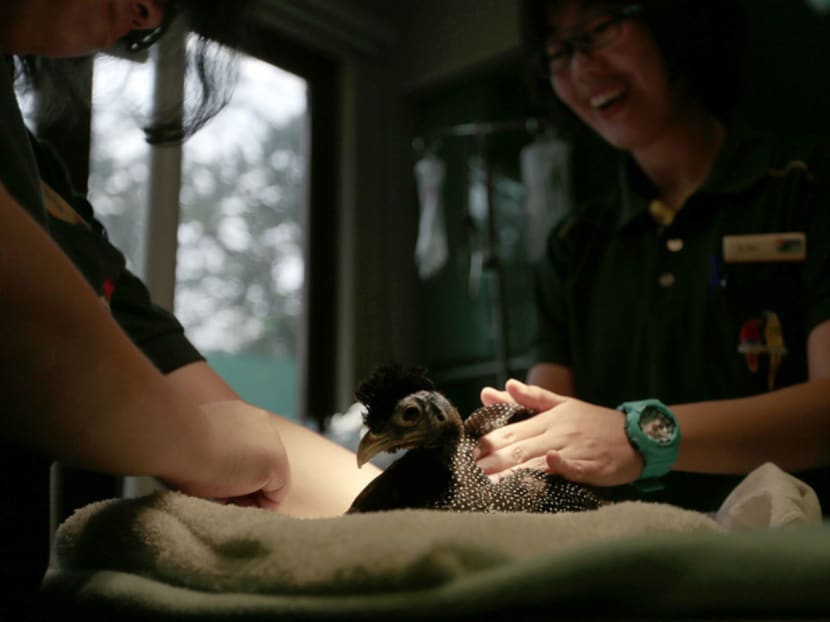Sick birds flock to S’pore veterinarian for avian acupuncture
SINGAPORE — After a quick alcohol rub, Dr Neo Pei Ci’s hands are steady as she pushes the tip of a needle into her patient’s skin and injects a tiny amount of diluted Vitamin B. She does this a few times on the patient’s legs and then on the back. The entire procedure, a type of acupuncture, takes about 15 minutes. Her patient? A Crested Guineafowl suffering from a gastro-intestinal condition.

Veterinarian Dr Neo Pei Ci massaging a Crested Guineafowl after giving it acupuncture at Jurong Bird Park. Photo: Jason Quah
SINGAPORE — After a quick alcohol rub, Dr Neo Pei Ci’s hands are steady as she pushes the tip of a needle into her patient’s skin and injects a tiny amount of diluted Vitamin B. She does this a few times on the patient’s legs and then on the back. The entire procedure, a type of acupuncture, takes about 15 minutes. Her patient? A Crested Guineafowl suffering from a gastro-intestinal condition.
Over the past year, Dr Neo, a veterinarian at Jurong Bird Park, has used avian acupuncture to treat at least 20 birds suffering from a range of conditions, including head trauma and mental disorders, such as stress.
For this patient, the Crested Guineafowl, Dr Neo explained that the injections targeted acupoints to improve digestion, and stop diarrhoea and regurgitation, as well as reduce inflammation.
First used on livestock and production animals such as horses and cows many years ago, veterinary acupuncture has gained popularity as a complement to conventional treatment. While it is now widely practised on mammals such as cats and dogs, avian acupuncture has become more established only in recent years as avian medicine has progressed more slowly.
Compared with other animals, there is more difficulty restraining birds for treatment, and their thinner skin requires shallower acupoints, said Dr Neo, 30, in an interview with TODAY at the Jurong Bird Park on Wednesday.
Avian acupuncture treatment, which extrapolates acupoints from mammalian patients, takes different forms depending on the nature of the patient. For example, the Crested Guineafowl required aqua-puncture — a technique used for birds that are alert and active. Traditional acupuncture would be used for weaker or collapsed birds, where the needles can be left in the bird for at least two minutes, said Dr Neo.
And, in the case of one-day-old ducklings that had collapsed hours after hatching, their skeletons were still too soft for needles, so Dr Neo used another technique that involved a laser to stimulate the acupoints.
“With experience and practice, the acupoints can be easily felt as natural indentations within the muscles, between the muscles or within the skeletal structure,” said Dr Neo, who started practising avian acupuncture after attending a course on veterinary acupuncture last November by Dr Allen Schoen from the United States.
Dr Schoen is regarded as one of the pioneers of the practice.
Dr Neo’s interest in avian acupuncture was piqued after an encounter with an endangered 10-week-old Hyacinth Macaw chick that was dying. The bird had problems with its intestinal tract and food was stuck in its crop (the storage area in its neck), slowly starving it. “We tried all the conventional treatment, we tried the normal drugs that are being used for baby birds, but it didn’t work at all,” said Dr Neo.
Her friend, a small animal clinician who does acupuncture, then suggested applying pressure on an acupoint. “It was very amazing because the second we applied pressure there his crop started moving. And he got better. He’s actually still alive now,” she recounted.
Dr Neo said: “I thought we could use it (avian acupuncture) on our birds, especially since quite a lot of our birds are geriatric patients now and I just want to improve their wellbeing whenever I have the chance.
“Right now we can use medicine, supplements, but I just want to give them a more holistic treatment … We’ve helped a couple of birds and it’s actually quite amazing.”






